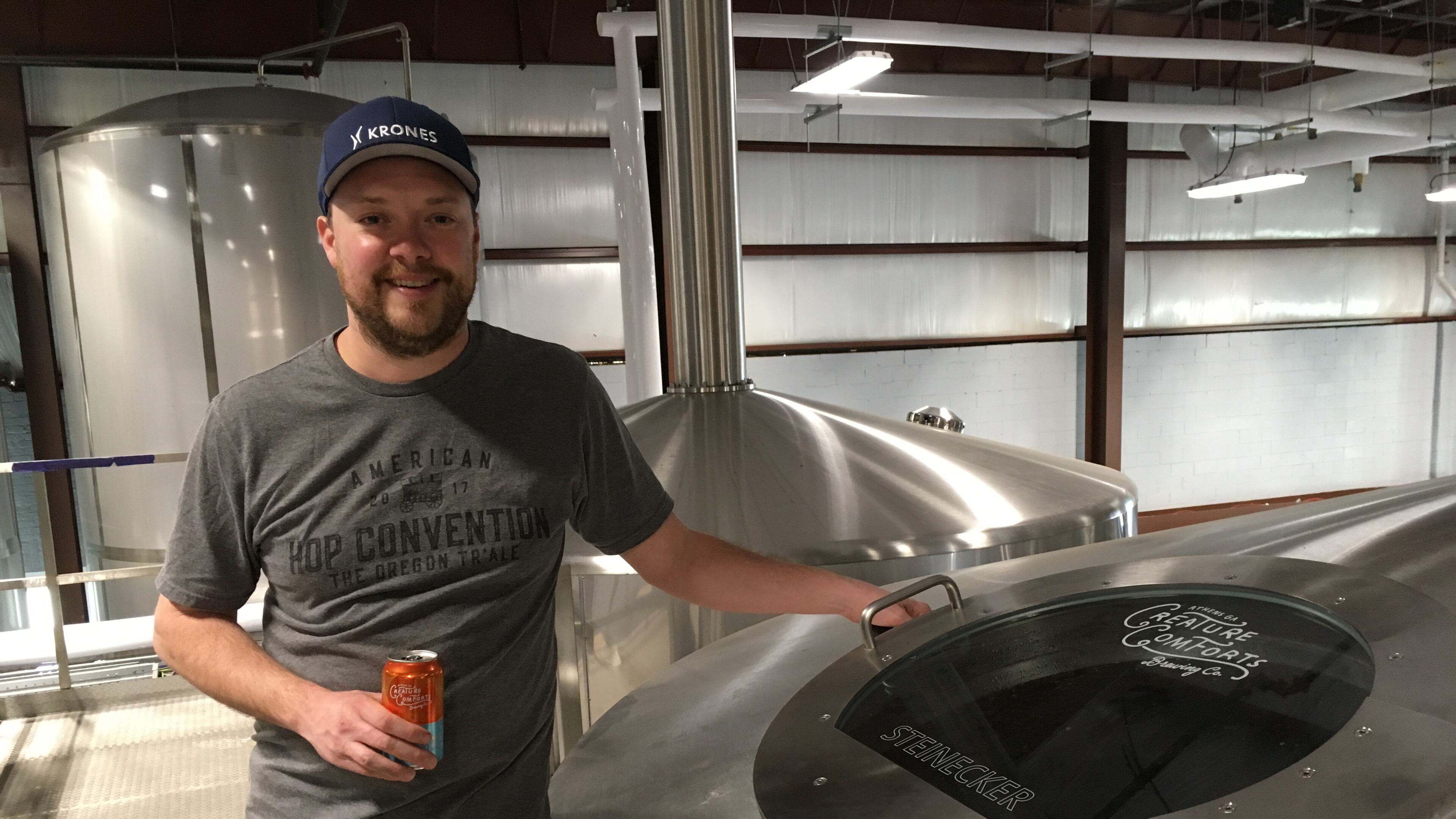Beer Town: Creature Comforts new brewery is fully operational

Early in 2017, Athen's Creature Comforts Brewing Co. announced plans to greatly expand its brewing operations by adding a second facility, with an investment of $11 million.
Now, the new, state-of-the-art brewery, housed in a 40,000-square-foot building at the historic Southern Mill complex on North Chase Street, is fully operational, with 50,000 barrels of annual fermentation at current capacity, and room to add more fermentors on a “plug and play” basis.
When I visited a few weeks ago, the first batches of several core beers were in the bright tanks, and packaging was about to get underway.
Creature Comforts brewmaster and co-founder Adam Beauchamp took me on a tour that included an up-close view of the fully automated 85-barrel four vessel brewhouse from German manufacturer Steinecker and the new filler and canning line from Krones.
In practical terms, the new equipment will give Creature Comforts the capacity to brew nearly double the current output of mega-popular Tropicalia IPA , as well as more of favorites such as Athena, Bibo Pilsner and Reclaimed Rye.
During the show and tell, Beauchamp pointed out some of the bells and whistles in the new system, including automated vessels for salt and hop dosing. There’s also a system that sends the spent grain to a silo at a loading dock where local farmers can pick it up and feed it to their livestock.
One of most complex and expensive pieces of equipment is a huge silver centrifuge that looks like a lunar lander. It’s designed to remove yeast and other solids from the finished beer while retaining desired hop and malt flavors.
“The bowl inside weighs two tons. It’s covered in sensors and controllers, and again, fully automated,” Beauchamp said. “We should be able to dial in exactly the clarity we want. And people might be interested to know, it has a haze mode, as well.”

As far as a timetable for getting beer into the market, Beauchamp was optimistic that it would be sooner than later.
“We’ve had a few little issues here and there, but we’ve had a team of Steinecker Krones guys here the whole time and they’re all over it, so no real problems, so far, Beauchamp said. “We’re ready to go. And what that means for folks is that the core beers are going to be more readily available.”
“Hopefully by the end of March or early April, you’ll start to see product roll out. We’re changing to the cardboard cartons, as opposed to the plastic holders, so that will be a noticeable right away. As far as getting ramped up, we have a pretty good confidence in the beers that are coming out.”
Creature Comforts celebrates its fourth anniversary April 21-22. And given that milestone, it’s remarkable how fast it has grown among similar smaller breweries.
“The anniversary is always a lot of fun,” Beauchamp said. “It’s an event with a lot of different facets. We have a lot of craft stuff, food, entertainment, and basically pulling out all of the stops in terms of the beer.”
As far as the its rapid growth, Beauchamp compares Creature Comforts to Modern Times in San Diego California and Ninkasi in Eugene, Ore.
“Ninkasi did it,” Beauchamp said. “They got to that 100,000 barrel mark and beyond. Modern Times is just unbelievable. They’re a year older than us but they’ve been on fire.”
Toward the end of our tour, Beauchamp introduced me to Johannes Kaestner, the Commissioning Brewmaster from Krones, who was in charge of the team installing and testing all of the equipment.
Kaestner has built breweries all over the world, including the massive Guinness brewery in Dublin, which is among the largest in the world. But he told me that he’s enjoyed a different challenge at American craft breweries.
“This is one of the smaller plants we’ve built, and it’s always interesting to work with these kinds of brewers,” Kaestner said. “The kind of raw materials they use here, and just the huge amount of hops makes it a bit more challenging. These craft breweries are really pushing the equipment to the limit with hops and high gravity beers.
"But it makes it more interesting. One the reasons I wanted to do this job is because you see so many different ways of brewing, and how the equipment can be used. And so I also learn a lot about brewing. We work very closely with the brewers to give them the beer that they want, and that's a lot of fun.”
RELATED:
Read more stories like this by liking Atlanta Restaurant Scene on Facebook , following @ATLDiningNews on Twitter and @ajcdining on Instagram .

